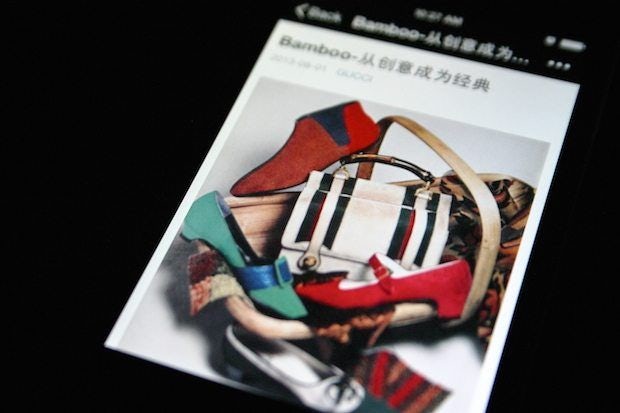What started as an app for talking to friends has since become the default medium for all kinds of relationships, including those between customers and sales staff.
Shoppers now use WeChat in the expectation that by dealing directly with a real person they’ll be able to get a response at any hour of the day from wherever they may be. Expectations are especially high for luxury retail staff.
When customers enter a store and request a sales associate’s WeChat, it’s very difficult for them to decline. And yet if they accept, it poses a problem for brands — does the sales associate present brands in a consistent way? Are they offering any discounts they shouldn’t? Will the sales associate take the client elsewhere if they switch employers? Questions like these can create distrust between management and the sales team.
For many luxury brands, regulating WeChat usage by sales associates is a big but awkward task, an elephant in the room.
Stores have sales targets to meet, and want to give sales staff enough freedom to follow up with customers off the floor, especially during weekday nights and weekends. But staff are also driven by their own personal sales targets, which could result in commissions and bonuses. For this reason, sales staff sometimes treat client information as personal property, and are unwilling to share it with their employers.
How can brands solve this problem? From our conversations with several store manager of luxury brands in China, we learned that many of them have developed unique approaches.
According to one luxury brand store manager, who wishes to remain anonymous, sales associates are assigned a work phone and told that it should be used for all conversations with clients, including WeChat conversations. Once the employment contract is terminated, both the phone and the contact information within remain the company’s property.
The measure is draconian and not necessarily effective. In most instances, sales staff can easily log on to their work WeChat account from their personal phone, and continue their sales pitches without oversight.
Alternatively, a Hermes store manager took a more hands off approach, saying, “A manager can only oversee so much in store. I choose to train staff at a higher level. For example, we periodically discuss case studies and read strategy books to learn how to communicate with clients more effectively.”
A Prada retail store manager saw customers' personal WeChat accounts as useful customer data, saying they analyze and discuss customers’ WeChat posts openly, adding any notable information to the company's Content Relationship Management (CRM) system.
Coach has been experimenting with a third-party service that integrates the functions of WeChat and an enterprise CRM tool. The mechanism is quite straightforward; the customer can message the brand via its official WeChat account, where the message is then forwarded to the third party app for a sales associate to follow up on.
The interface of the third party app is like WeChat, and sales staff can manage their contacts from there, but the information is also added to the CRM system. The app allows sales staff to browse a customer's purchasing history and send personalized event invitations, balancing the need for personal service with brand guidelines.
Store managers can log into the app as an administrator to check more detailed information, tracking sales records and seeing how individual salespeople rank at a regional level.
The third-party service provider VML told us they significantly improved Coach’s sales performance during a trial run from March to July 2017, when their app was used in a total of 165 Coach stores nationwide. They say more than half of customers who used WeChat to engage with sales staff using their app sought “product purchase” related advice, and those who used the app spent nearly 26% more than other customers.
WeChat is a great tool for sales staff to build closer relationships with customers, but luxury brands must take care not to be left out.


